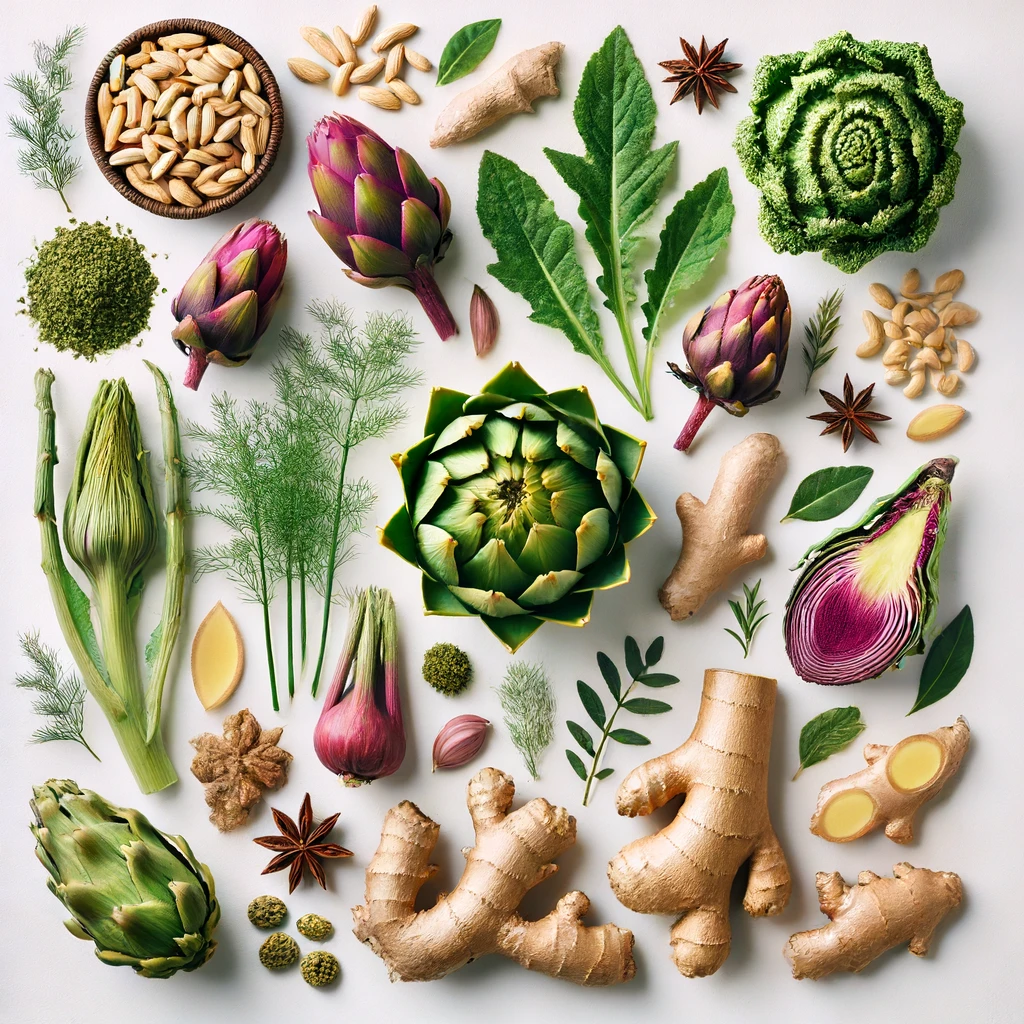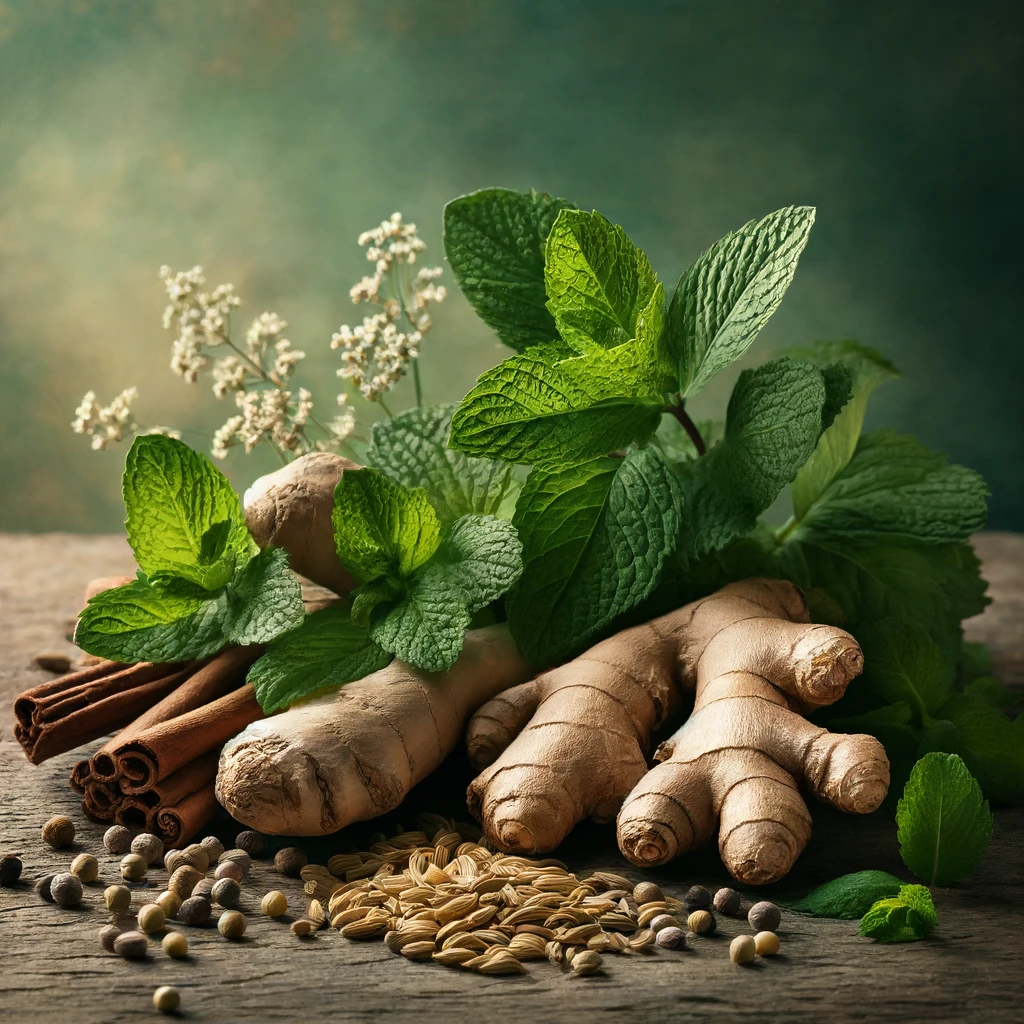As time goes by, people are increasingly interested in natural and holistic ways to support and improve their health, both in general and particularly for digestive health. Digestive bitters are a great aid in improving digestion and maintaining overall health and wellbeing.

Digestive bitters are plant extracts made from bitter-tasting plants. They have been traditionally used in various cultures for centuries and thousands of years as herbal remedies known to stimulate digestion and support the body's natural processes. By harnessing the power of bitter plants, digestive bitters activate the digestive system and promote the production of digestive enzymes and bile, which are essential for breaking down food and effectively absorbing nutrients.
As people become more aware of the additives in food and the unhealthiness of processed foods and synthetic medications, the natural, often forgotten solutions found in nature are becoming more attractive—solutions that have been known since ancient times. Bitter plants have always supported people throughout history. People are rediscovering these ancient remedies and weaving them back into their daily lives to balance digestion and prevent digestive problems such as bloating, indigestion, and uncontrollable sugar cravings.
What are Digestive Bitters?
Digestive bitters are extracts from bitter plants with a digestive-supporting and stimulating effect. These extracts are typically used in liquid form and have a very strong bitter taste. The primary mechanism through which bitters work is by stimulating the digestive system, encouraging the body to more effectively produce stomach acid, digestive enzymes, and bile—all of which are crucial for optimal digestion, food breakdown, and nutrient absorption.
How Do Digestive Bitters Work?
Mechanism of Action
Digestive bitters primarily work by stimulating communication between our taste receptors and the digestive system. When we consume bitter-tasting plants, they activate the bitter receptors on the tongue. This activation sends a signal to the brain, which then commands the digestive system to get to work. The signal travels to the digestive system via the vagus nerve, triggering a cascade of reactions aimed at efficiently digesting food.
The Role of Digestive Bitters as Digestive Juice Activators
One of the key mechanisms of action of digestive bitters is the activation of digestive juices—stomach acid, bile, and digestive enzymes. These are essential for breaking down food and absorbing nutrients. Bitters activate these processes in the following ways:
- Saliva Production: The first reaction to digestive bitters is the production of saliva, which contains enzymes like amylase that begin the digestive process.
- Stomach Acid Production: Digestive bitters stimulate the production of stomach acid and pepsin, an enzyme essential for digesting proteins. Adequate stomach acid is crucial for breaking down proteins and other nutrients, as well as for killing pathogens that may enter the body with food. Sufficient acidity also signals the closing of the lower esophageal sphincter to prevent food from coming back up, which helps prevent heartburn.
- Bile Production and Release: Digestive bitters play an important role in stimulating the liver to produce more bile and in encouraging the gallbladder to release stored bile. Bile is essential for emulsifying and digesting fats, and it aids in the absorption of fat-soluble vitamins (A, D, E, and K). It also helps remove toxic waste from the body.
- Pancreatic Enzymes: Digestive bitters stimulate the pancreas to release digestive enzymes, including lipase, amylase, and protease. These enzymes are crucial for breaking down fats, proteins, and carbohydrates in the small intestine, allowing for better nutrient absorption.
Effects of Digestive Bitters on Digestion
Digestive bitters not only stimulate the production of digestive juices but also have a positive impact on intestinal motility and digestion overall.
Intestinal Motility: Digestive bitters help regulate the speed at which food moves through the digestive tract, promoting smooth digestion and reducing the risk of constipation. At the same time, they regulate diarrhea by stimulating the production of digestive enzymes and bile.
Appetite Regulation: Bitter plants help regulate ghrelin, the hunger hormone. Short-term, they may stimulate appetite, but in the long run, they help reduce overall hunger. This can help prevent overeating and restore a balanced sense of hunger. Additionally, digestive bitters help the body absorb more nutrients from food, which reduces the need for excessive eating.
Reducing Digestive Discomfort: By stimulating digestion, digestive bitters help reduce unpleasant symptoms like bloating, gas, stomach pain, constipation, diarrhea, and heartburn. Improved digestive juice production and faster intestinal movement improve overall digestion.
The Gut-Brain Connection: There’s growing talk about the connection between the brain and the gut. Better balance on the gut-brain axis means better overall health and wellbeing. By supporting effective digestion and reducing digestive disruptions, digestive bitters indirectly promote emotional wellbeing.
In summary, digestive bitters stimulate a series of processes through the activation of taste receptors, which enhance digestion.
Health Benefits of Digestive Bitters
Better Digestion and Nutrient Absorption
Digestive bitters help kickstart digestion and ensure that we absorb all the nutrients from our food.
- Food Breakdown: Digestive bitters stimulate the production of all digestive juices, which help break food down into smaller particles. This leads to more effective digestion and reduces the likelihood of undigested food causing discomfort in the stomach or nutrient deficiencies.
- Better Vitamin and Mineral Absorption: Digestive bitters make it easier to absorb nutrients from food. Increased bile production improves the absorption of fat-soluble vitamins (A, D, E, and K), while better pancreatic enzyme production ensures that nutrients from proteins, carbohydrates, and fats are absorbed more effectively in the small intestine.

Relief from Digestive Issues
Digestive bitters can relieve many digestive complaints.
- Reduced gas and bloating: Improved production of digestive enzymes and bile speeds up food breakdown, reducing fermentation of undigested food particles in the intestines—a common cause of gas.
- Less discomfort from overeating: Digestive bitters enhance and accelerate digestion, allowing your body to handle larger meals more comfortably and reducing that heavy feeling after eating.
- Reduced constipation: Bitter flavors stimulate the entire digestive tract, improving intestinal peristalsis—the contractions that move food along. This prevents food from stagnating in the gut, reducing constipation and leaving you feeling lighter.
- Reduced diarrhea: Digestive bitters gently and naturally support the digestive system during diarrhea. Bitter plants stimulate the digestive glands, increasing digestive juice production, promoting more efficient food breakdown, and balancing digestion overall. This not only eases diarrhea but also helps prevent and relieve other digestive problems.
- Heartburn relief: Strong stomach acid is essential for preventing heartburn. Adequate stomach acid signals the esophageal sphincter to close properly, keeping food from rising back up. Supporting stomach acid production is therefore crucial for reducing heartburn.
- Gallbladder health: Digestive bitters:
- Stimulate the liver to produce more bile, improving bile flow and consistency. Too thick bile can lead to gallstones and associated pain.
- Stimulate the gallbladder to release bile more effectively, preventing bile stagnation and potentially reducing gallbladder symptoms and gallstone formation.
- Support liver detoxification—bitter herbs encourage liver cleansing and enhance overall liver function.
Reduced Sugar Cravings
Digestive bitters have a unique ability to regulate appetite—whether it's reducing sugar cravings or boosting healthy appetite when it's lacking.
- Reducing sugar cravings: Studies show that bitter flavors literally switch off certain receptors in the brain linked to sugar cravings. Digestive bitters help adjust brain chemistry, making it less susceptible to sugar's addictive pull. Additionally, bitters influence ghrelin—the hunger hormone—in an interesting way: initially, they may briefly increase appetite, but over time, they significantly reduce hunger. This helps prevent overeating and restores a balanced appetite. Because bitters also help the body digest food and absorb nutrients more efficiently, the body feels less nutrient-deprived, allowing you to enjoy your meals without unnecessary cravings.
- Increasing appetite when it’s low: Digestive bitters activate bitter receptors, preparing your body to receive food and helping cultivate a healthier appetite.

Beneficial Effects on Overall Gut Health
Besides directly stimulating digestion, digestive bitters can also enhance overall digestive system health.
Improved microbiome:
Digestive bitters can positively impact the gut microbiome—the community of bacteria living in our intestines. By creating a better environment through more effective digestion, bitters help beneficial bacteria flourish while suppressing harmful ones.
Reduced gut inflammation:
Certain bitter plants possess anti-inflammatory properties that soothe the gut lining. This can be especially helpful for chronic conditions such as irritable bowel syndrome (IBS).
Supports Natural Detoxification
Digestive bitters support the body’s natural detoxification processes, particularly by stimulating liver function.
- Supporting liver function:
Digestive bitters promote liver activity and bile production, both essential for toxin elimination. The liver processes toxins and metabolic waste, while bile helps to flush them out of the body. - Eliminating toxins:
By enhancing liver and bile function, digestive bitters help effectively remove toxic substances from the body.
Traditional Use of Bitter Plants in Various Cultures
The use of bitter plants is ancient and spans cultures around the world. In traditional Chinese medicine, bitters were used to balance the body's energy system and aid digestion. Similarly, bitters have been used in Ayurveda in India, where they were used for regulating appetite, cleansing the liver, and supporting digestion.

In Europe, the use of bitter plants also has a long history—they were consumed as aperitifs before meals or digestives after meals to aid digestion. One of the most well-known examples is Swedish bitters—a popular tonic believed to have numerous health-supporting effects. Another well-known example is Angostura bitters, originally produced as a remedy for digestive problems but later adapted for cocktail making. Today, Angostura produces a wide variety of bitters, primarily for use as ingredients in alcoholic cocktails.

Native American cultures have used bitter plants for medicinal purposes. For example, Native American tribes used dandelion root and burdock root for digestive issues and general health support.
Throughout history and across cultures, bitter plants have been valued primarily for their ability to improve digestive function and alleviate digestive disorders. Today, we are rediscovering bitters as a valuable natural remedy for digestion.
Examples of Some Herbal Ingredients in Digestive Bitters
Digestive bitters typically contain several plant ingredients, each supporting the digestive system in its own way and synergistically. Some common ingredients in digestive bitters include:
- Burdock Root: A powerful antioxidant that supports digestion and reduces inflammation.
- Dandelion Root: Stimulates liver function, supports good bacteria, and aids in detoxification.
- Fennel: Activates digestive enzymes and helps reduce bloating.
- Gentian Root: Known as the "king" of bitters, reduces sugar cravings, increases stomach acid, and stimulates bile production.
- Ginger: Helps with stomach pain and nausea, supports weight loss, and lowers cholesterol and blood sugar.
- Juniper Berries: Antioxidant, strongly anti-inflammatory, and fights harmful bacteria.
- Peppermint: Helps digest food (especially fats), reduces gas and stomach cramps.
- Artichoke: Supports liver function, improves food digestion, balances good bacteria, and reduces digestive issues.

What are Bite the Plant Digestive Bitters Made Of?
These digestive bitters contain a carefully selected combination of plants that gently yet effectively support digestion.

- BURDOCK ROOT – Strong antioxidant, supports digestion, reduces inflammation
- DANDELION ROOT – Stimulates liver function, supports beneficial bacteria, detoxifies
- FENNEL – Activates digestive enzymes, helps relieve bloating
- GENTIAN ROOT – The "king" of bitter herbs, reduces sugar cravings, increases stomach acid and bile production
- GINGER – Relieves stomach pain and nausea, supports weight loss, lowers cholesterol and blood sugar
- JUNIPER BERRIES – Antioxidant, strongly anti-inflammatory, fights harmful bacteria
- PEPPERMINT – Helps digest food (especially fats), reduces gas and stomach cramps
- ARTICHOKE – Supports liver function, improves digestion and beneficial gut bacteria balance, reduces digestive issues
How to use digestive bitters?

Dosage: Take one pipette (6–7 drops) before meals. You can increase the amount if you experience digestive discomfort.
Timing: Digestive bitters should be taken about 5–10 minutes before eating to prepare and activate digestion. Hold the bitters in your mouth to experience the taste for as long as possible.
If you've eaten a heavy meal and forgot to take the bitters beforehand, they can still activate digestion afterward—just take them whenever you remember.
Tips for Incorporating Digestive Bitters into Your Daily Routine
- Consistency: Create a daily habit of taking digestive bitters before every meal—especially before heavier or larger meals. Consistency is key to experiencing their full effect.
- Keep them handy: Place your digestive bitters bottle in an easily accessible spot, like in the kitchen or on the dining table, so you'll remember to take them before eating. If you eat out frequently, carry a bottle in your bag.
- Dilute in water: If the digestive bitters taste too strong, dilute them in a small amount (e.g., a teaspoon or tablespoon) of water. This makes them easier to take without reducing their effectiveness.
- Link to your existing routines: Connect taking digestive bitters with tasks you already do regularly before meals, such as setting the table or preparing food. Linking bitters to established routines helps reinforce the habit.
- Support your health in other ways: Combine digestive bitters with other healthy habits like eating slowly and choosing nutritious foods, maximizing support for your digestive system.
Summary of How Digestive Bitters Benefit Digestion

Digestive bitters have numerous beneficial properties that support gut health and overall well-being. They stimulate the production of digestive enzymes and bile, aiding the breakdown and absorption of nutrients. By improving intestinal motility, bitters help prevent constipation and promote smooth digestion. They also help regulate appetite—increasing it for those with low appetite or enhancing feelings of fullness and reducing sugar cravings to prevent overeating. Additionally, digestive bitters support gut health by positively influencing the microbiome and reducing inflammation. Their role in enhancing liver function and detoxification offers valuable benefits in today's toxic environment.
Add digestive bitters to your daily routine

Adding digestive bitters to your daily routine is a simple yet highly effective way to support your digestive system. They’re part of a holistic approach to maintaining digestive health—alongside balanced nutrition, regular physical activity, and stress management.
Humans have lived in harmony with bitter flavors for a long time. It’s only in recent decades that we’ve largely bred them out of our food, but our bodies still remember and crave that balance. Bitterness is much more than just a taste—it has powerful, positive effects on the body. It's a natural ally for our digestive system, which is why bitters can be used long-term as part of good digestive hygiene.
Clients about digestive bitters

MERJE PEEKMA
After four pregnancies, my digestion had been out of balance constantly. But after using digestive bitters for a month, I’ve honestly had no more issues. I take them every day.
IREEN LAHT
Since I started taking a few drops of the digestive bitters before dinner, I haven’t had any more gallbladder attacks. And that’s how it’s been. So, it’s definitely good and useful stuff. 🙂 Before, I used to have pain once or twice a month if I slipped up. I had to be really careful about what, when, and how much I ate.


INDREK ANDEMA
A really good and nice helper. I used to struggle with heartburn and reflux, but since using the digestive bitters, I haven’t had any problems in the last six months. I can also handle spicier foods now. The apple cider vinegar version is my favorite, but the one with alcohol also has a nice taste. The new bottle has a really beautiful design too 😉
IVI KURG
I have to admit, sometimes I forget and miss a dose. But I’ve noticed that my sugar cravings have really decreased, and I don’t get random hunger pangs anymore. Those are the main things that come to mind right away.


